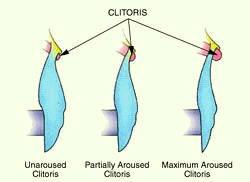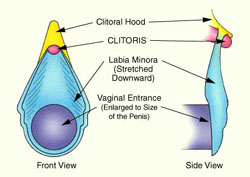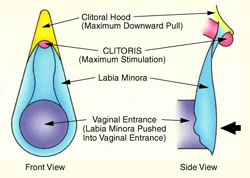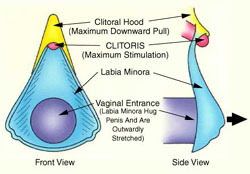INTERCOURSE
How A Woman Achieves
Orgasm with Intercourse
Orgasm can only be achieved when
the clitoris is maximally aroused.


With initial penile penetration,
the vaginal entrance is enlarged to allow entrance of the penis. This stretches
the labia minora and causes a downward pull on the clitoral hood, therefore
stimulating the clitoris.

During forward penile motion, the
labia minora are pushed into the vaginal entrance to create the maximum downward
pull on the clitoral hood and maximum clitoral stimulation.

During withdrawal penile motion,
the labia minora hug the penis and are pulled outwardly. This creates a maximum
downward pull on the clitoral hood and therefore maximal clitoral stimulation.
During the brief moment between
maximum penile penetration and the start of penile withdrawal motion, the maximum
downward pull on the clitoral hood is relaxed, allowing the clitoris to recover
from maximal stimulation. This recovery of the clitoris from maximal stimulation
also occurs in the transition between maximum withdrawal and the start of penetration.
This is called the transition of the clitoris.

The in-and-out movements of
the penis combined with the transition between the in-and-out movements of the
penis cause a vibratory up-and-down stimulation of the clitoris. This vibratory
action that stimulates the clitoris is like driving your car over a series of
speed bumps. The forward motion of the car is converted to an up-and-down vibratory
action by the series of speed bumps.





